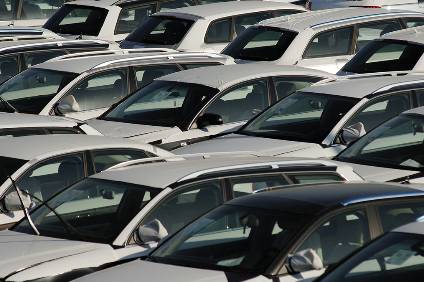
UK new car registrations fell by 2.4% in 2019 to 2.3 million units, as multiple factors undermined the market – including Brexit uncertainty and collapsing diesel share.
Some 2,311,140 new cars were sold in the UK in 2019. The SMMT said the decline to the market reflected weak business and consumer confidence, general political and economic instability and confusion over clean air zones.

Discover B2B Marketing That Performs
Combine business intelligence and editorial excellence to reach engaged professionals across 36 leading media platforms.
The annual 2.4% decline was driven primarily by falling private demand, with registrations from consumers down 3.2%, while the small volume business market also fell, down 34.4%. Fleet registrations, meanwhile, remained broadly stable, up 0.8%.
There was modest growth in demand for petrol cars, up 2.2%. However, this was not enough to offset the significant 21.8% decline in diesel car registrations. December marked the 33rd month of diesel decline, as continued anti-diesel rhetoric and confusion over clean air zones hit demand, the SMMT said. This has resulted in drivers keeping their older, more polluting vehicles on the road for longer, holding back progress towards environmental goals, the SMMT noted.
Bucking the overall trend, combined alternatively fuelled vehicle (AFV) registrations surged in 2019 to take a record 7.4% market share. Hybrid electric vehicles (HEVs) continued to dominate this sector, with registrations increasing +17.1% to 97,850 units. Battery electric vehicle (BEV) registrations experienced the biggest percentage growth, rising +144.0% to 37,850 units and overtaking plug-in hybrids for the first time.
The SMMT noted that while the huge increase in BEV demand is welcome, their 1.6% market share is still tiny and underlines the progress needed to reach the 50-70% share the government envisages in the next 10 years. This ambition has not been helped by the significant decline of zero emission-capable plug-in hybrids, down 17.8% – further evidence of the consequences of prematurely removing upfront purchase incentives before the market is ready.
The figures come as SMMT publishes data showing the UK new car fleet average CO2 rose for a third successive year, by +2.7% to 127.9g/km. Massive investment by manufacturers into advanced powertrains, lightweight materials and aerodynamics means new cars are ever more efficient, with new cars emitting, on average, some -29.3% less CO2 than models produced in 2000. However, this could not offset the overall rise which was due primarily to the effect of the more stringent WLTP test of new models, which generally ascribes a higher CO2 value than the older NEDC test to the same model, as well as some segment shifts and the decline in diesel.
December ended a turbulent year on a positive, however, with the market up 3.4%.
Mike Hawes, SMMT Chief Executive, said: “A third year of decline for the UK new car market is a significant concern for industry and the wider economy. Political and economic uncertainty, and confusing messages on clean air zones have taken their toll on buyer confidence, with demand for new cars at a six-year low.
“A stalling market will hinder industry’s ability to meet stringent new CO2 targets and, importantly, undermine wider environmental goals. We urgently need more supportive policies: investment in infrastructure; broader measures to encourage uptake of the latest, low and zero emission cars; and long term purchase incentives to put the UK at the forefront of this technological shift. Industry is playing its part with a raft of exciting new models in 2020 and compelling offers but consumers will only respond if economic confidence is strong and the technology affordable.”
The Ford Fiesta was again the bestselling new car in the UK in 2019.
According to the SMMT data, 77,833 Fiestas were sold, giving it a substantial lead over the second-placed car, the Volkswagen Golf, which recorded 58,994 registrations.
Third place went to the Ford Focus, with 56,619 registrations, while the top five was completed by the Vauxhall Corsa, with 54,239 registrations, and the Mercedes-Benz A-Class, with 53,724.
The UK’s bestselling SUV in 2019 was the Nissan Qashqai, which came sixth in the overall chart with 52,532 registrations.
Despite the overall decline in 2019, the UK car market remains the second biggest in the EU, behind Germany.






